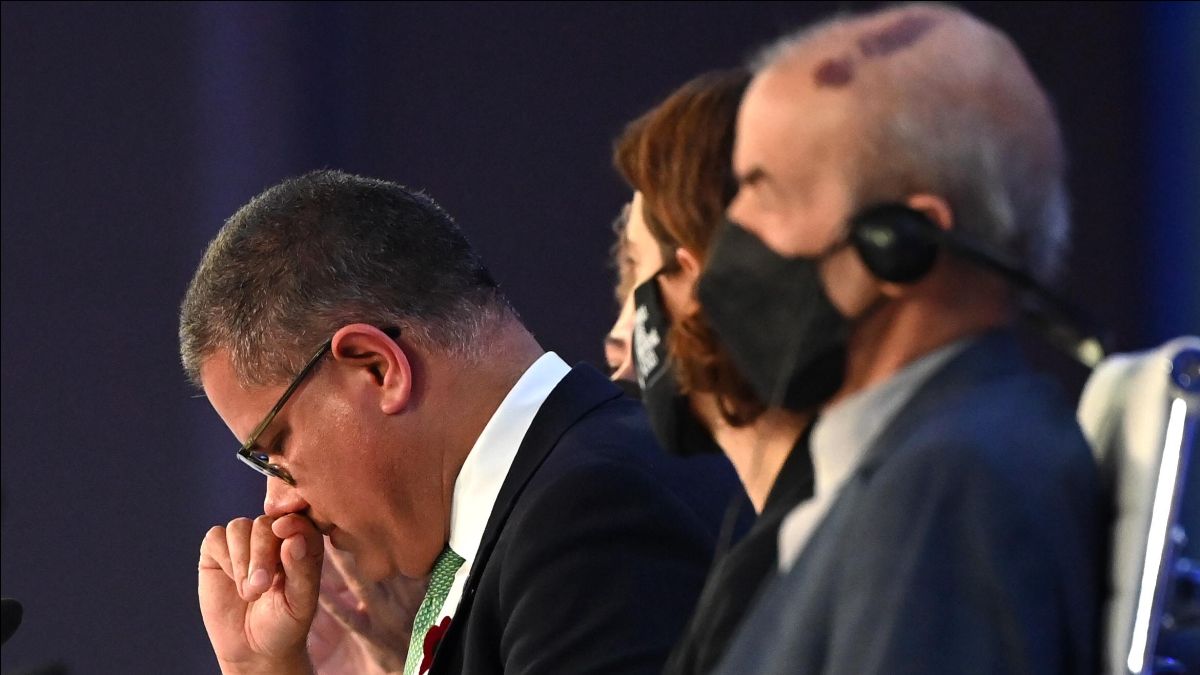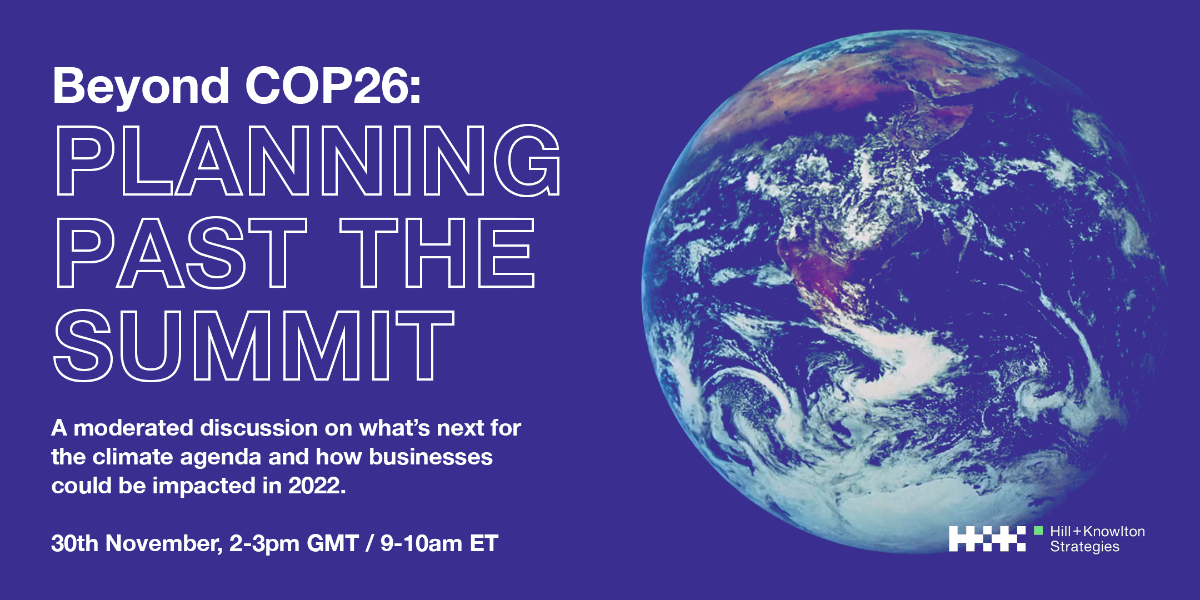COP26 drew to a close late on Saturday evening. The goal heading into the summit was to “keep 1.5°C alive.” This means nothing less than ensuring it is still practically possible to halve global greenhouse gas emissions by the end of 2030 if we’re to ensure we hit the 1.5 degree target and avoid the worst effects of a changing climate.
Compromise was the key outcome of COP26. In the words of the UN Secretary-General, this was “an important step, but it’s not enough.” This is putting it lightly. While the outcome was anything but “blah, blah, blah” to paraphrase Greta Thunberg, her frustration, the anger of so many global citizens of all ages, and disappointment of those nations with most at stake was no less valid. What was achieved was unthinkable even two years ago. However, there is still much to do. The real success of Glasgow was creating a framework over the next two years that could keep 1.5°C alive. Does this make it enough – no. Is 1.5°C is still attainable – yes. Does momentum on climate action continue to strengthen – entirely.
How did COP26 count?
The world is on a 2.7°C pathway and pledges at COP26 could keep the world’s rising temperatures to within 1.8°C.
- The date for when countries will be under pressure to come back with increased climate ambitions was brought forward to next year (instead of 2030 as originally slated).
- Specific reference was made for the very first time to moving beyond fossil fuels in the form of coal. While the difference between “phase down” as adopted “phase out” as proposed is material, this is less significant than its inclusion. The economics of coal is already perilous. This outcome adds significant weight to fundamental challenges faced by the sector and a broader precedent.
- Countries reached an agreement on key outstanding aspects of the “Paris Rulebook.” Covering issues from carbon markets to transparency in reporting progress against climate goals, key outstanding chapters of work linked to the implementation of the Paris Agreement were finalised.
- The goal of limiting global warming to no more than 1.5°C (rather than well below 2°C with the aim of 1.5°C) was crystalised.
- A step-change in the contribution of businesses, cities, regions, investors was clear. While not part of the official UN COP process (i.e. the agreement between world governments), the contribution of ‘non-state actors’ was profound. Climate action is mainstreaming across the majority of sectors of the global economy. Work under the Race to Zero campaign initiatives and the associated $130 trillion backed finance-focused Glasgow Financial Alliance for Net Zero will continue. Governments approved rules to boost scrutiny of national climate pledges. There’s a parallel effort by the Science Based Targets initiative to do the same for companies, which might prove to be even more important.
- Parallel multilateral agreements on topics such as deforestation, methane emissions, and agriculture to co-operation between the US and China on emissions reductions, to a host of other issues, are significant to boosting momentum and all help lay the foundations for broader global tipping points in climate action.
- Additional pledges on finance to help those countries least responsible but most impacted by climate change adapt were put in place. Given an existing pledge to provide $100bn a year has not been met, this is critically important. Action on adaptation includes doubling global adaptation finance by 2025 and a two-year work programme for operationalising the Global Goal. This will require significant progress to maintain the faith of the most vulnerable countries.
- A deal was secured: the consequences of failure, comparable to what happened in Copenhagen in 2009, would have been truly catastrophic. This was a prospect if India were not bought onboard (on coal “phase out”/“phase down”).
What comes next?
“It doesn’t stop here, it only starts.” Frans Timmermans, executive vice-president, European Commission
The ultimate test of Glasgow is how leaders deliver on these promises with real, short-term, accelerated actions. COP27 in Egypt (in November 2022) is the next moment when this progress will be judged. In the interim, expect UK and Italian diplomacy on climate change to continue as they remain ‘COP Presidents’ through to the next COP.
Close attention will also be paid to China and U.S. who have agreed to co-operate on taking greater action to address climate change. With the joint declaration criticised in some quarters for being light on detail, the value of this partnership (or its limitations) will become clear over the coming months. Alignment of the world’s biggest two emitters was a pivotal factor in the success of agreeing the Paris Agreement at COP21. Reigniting this dynamic could be highly beneficial.
Another area to watch coming out post-Glasgow is new examples of multilateral action coming out of the COP process. For example, the US, EU, France, Germany and the UK plans to help fund South Africa’s transition away from coal through an $8.5bn partnership was heralded as a future model of multilateral action.
Details will also become clear on the implementation of the various multilateral initiatives announced during COP27. Expect each to be revisited in the run-up to COP27 with a focus on bringing other countries on board.
Trends to watch
COP26 puts pay to any room to doubt that action on climate change is irreversible and transforming the global economy. It’s not a question of when net zero will be achieved, but by when. Likewise, the interplay between the ‘real-economy’ and political momentum through COP is now clear.
Action is now the watchword. Delivery of commitments made across all sectors and by all actors will be expected and closely watched. Realising goals will have subsequent impacts across the real economy (e.g. reducing the cost of emerging technologies and driving further innovation as just two examples).
Action by business and investors has now become mainstreamed and is increasingly simply business as usual. The critical focus is on those left behind rather than companies leading the way. Those businesses yet to set net zero strategies can expect to come under increasing pressure. Those already on board can be expected to become increasingly vocal.
While not part of the final text, attention paid to the importance of a price on carbon was palpable heading into COP26. With the IMF championing an approach to global roll-out and broader support growing, expect this topic to gain increasing attention.
Climate change has never been a simple topic. The complexity involved – from politics to science to the response of business – will only get more pronounced. Conversely, the need to communicate with clarity and simplicity has never been more important. With increasing complexity expect greater scrutiny and a focus on accountability.
The financial sector is moving on scale to respond to climate change as, in parallel, the ESG agenda continues to mature. 2021 was a tipping point in ensuring key actors were onboard in the move to net-zero emissions, delivery of commitments made over coming years will help rewrite the financial system.
What we’re reading
- COP26 has achieved more than expected but less than hoped, Editorial Board, Financial Times
- COP Scorecard: Here’s What You Need to Know, Bloomberg Green
- Cop26 took us one step closer to combating the climate crisis, Christiana Figueres, The Guardian
- Forget the Words of This COP26 Deal. Follow the Money, David Fickling, Bloomberg
- ‘I see no financial obstacles to getting to net zero by 2050’, Jeffrey Sachs, Financial Times


H+K London maintained a presence throughout the Summit, offering insights and on the ground support to clients. While COP26 was a landmark moment for climate action in 2021, it has also heralded the start of an unprecedented decade of environmental action.
From calls for a global plastic treaty at the UN Environment Assembly in February 2022 through to the UN Biodiversity Conference in China during May, the environmental agenda will broaden and deepen. At the same time, global pressure for climate action is likely to accelerate and continue to build ahead of COP27 in Egypt.
To explore the significance of these moments and share practical insights into what organisations should look out for, we are convening a virtual panel of leading environmental campaigners and experts on 30th November, 2-3pm GMT. The intimate discussion will consist of a one-hour virtual moderated discussion, led by H+K’s Better Impact team.
Register for your free ticket here.